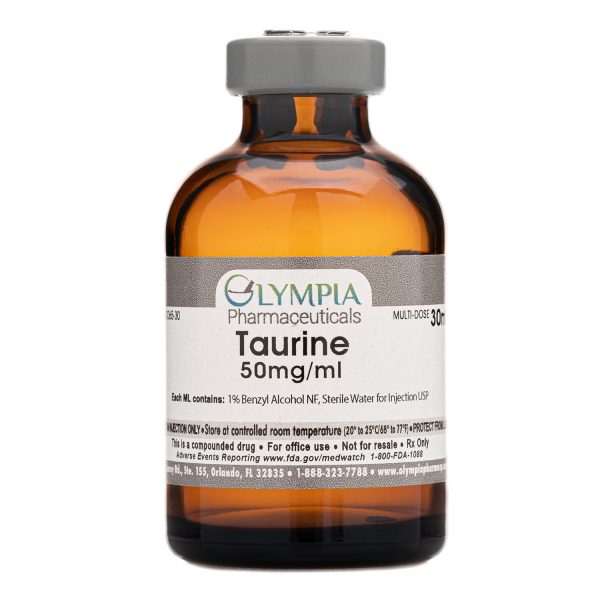
L-Taurine, otherwise known as taurine, is a conditionally essential amino acid. Unlike most amino acids, taurine doesn’t play a role in building proteins. It helps to maintain proper hydration and electrolyte and mineral balance in your cells supporting the functions of the digestive, nervous and immune systems. There are many conditions that may use taurine for treatment, including congestive heart failure, high blood pressure, hepatitis, high cholesterol, and cystic fibrosis. Taurine is also frequently used for its antioxidant properties to prevent cell-damaging side effects of chemotherapy.
There are many conditions that may use taurine for treatment, including congestive heart failure, high blood pressure, hepatitis, high cholesterol, and cystic fibrosis.
Taurine may be helpful for fatigue, reducing oxidative stress, mental performance, exercise performance, insomnia, psychosis, and anemia.
Dosage: Seek advice from a licensed physician, medical director, or other healthcare provider
Concentration: 50mg/ml
Route of Administration: IV/IM
When taken in reasonable doses, taurine causes no side effects.
There are several medications that may interact with taurine. Please be aware of the following:
– Lithium: Because taurine may have a diuretic effect, it may decrease how well lithium is excreted. This can leave serious side effects as lithium levels may be increased in the body.
– Antiplatelets: Therapy modification should be considered due to chance of increased adverse effects of antiplatelet medication. Bleeding may occur.
– Anticoagulants: Therapy modification should be considered due to chance of increased adverse effects of anticoagulant medication. Bleeding may occur.
– NSAIDs: Therapy modification should be considered due to chance of increased adverse effects of NSAIDs. Bleeding may occur.
– Salicylates: Therapy modification should be considered due to chance of increased adverse effects of salicylates. Bleeding may occur.
– Thrombolytic agents: Therapy modification should be considered due to chance of increased adverse effects of thrombolytics. Bleeding may occur.
Store at controlled room temperature. Protect from light.

Get your dream body now, pay later with Cherry!
Choose your payment plan before your next appointment- won’t harm your credit!

Get your dream body now, pay later with Cherry!
Choose your payment plan before your next appointment- won’t harm your credit!
7155 East Main Street, Scottsdale, AZ 85251
Phone: 602-456-9201
Text: 602-492-5736
E-mail: info@studio48medspa.com
Monday – Thursday 9:00 AM – 6:00PM
Friday: 9:00 AM – 3:30 PM
Every other Saturday: 9:30 AM – 4:00 PM
Sunday: Closed
*Studio 48 Medspa Scottsdale’s hours of operation are subject to change. Please call or book your appointment ahead of time to ensure availability. Walk – ins are welcome, but service availability is not guaranteed.